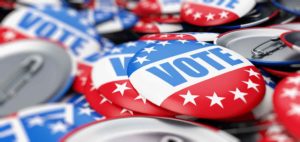Participating in Elections
 With the midterm elections approaching this November, I.M.A.M. continues to receive questions from believers about participating in the election process (regardless of whether it is federal, state, or local). We would like to take this opportunity to remind our beloved readers that every election is about important issues that affect the lives of all Americans.
With the midterm elections approaching this November, I.M.A.M. continues to receive questions from believers about participating in the election process (regardless of whether it is federal, state, or local). We would like to take this opportunity to remind our beloved readers that every election is about important issues that affect the lives of all Americans.
Hence, we have reissued our previous communication below in the hope that it will answer questions addressed to I.M.A.M. about the position of the supreme religious authority. While, this message will serve to remind the believers of the religious rulings, please note from the outset that I.M.A.M. does not and will not endorse any candidate or political entity because it is a non-profit organization.
Being Responsible Citizens
Many responsibilities toward our nation accompany the rights of American citizenship in a country with many diverse ethnic and religious communities. I.M.A.M. has made clear on many occasions that the position of the supreme religious authority is to encourage the believers to practice their constitutional rights according to the principle of good citizenship and integration while preserving their religious identity and noble culture. The subject of participating in elections, whether as voters or candidates, is an example of this principle.
Breaking the Stereotype
In the past decade, Islamophobia has been on the rise and its use attracts votes from certain groups. Some media outlets, as well as several political leaders, have been portraying Islam in a repulsive manner, such that stereotypes and false characterizations are replacing the true face of Islam. Accordingly, it is our duty as American Muslims to bring the true face of Islam to our fellow Americans, revealing to the world the true essence of our enlightened and uplifting religion through involvement in our communities, and to make our voices heard in our nation. An effective way to accomplish the latter is through participation in local politics and by voting in the elections.
Knowing the Issues
Nevertheless, voting without a full understanding of the issues and the stands of politicians on local, national, and international policies can be harmful. As such, community members are strongly encouraged to research candidates and political topics in order to make an informed decision, as referenced in ‘A Code of Practice for Muslims in the West’. Narrations tell us that Imam al-Sadiq (p) said, “He who is aware of the happenings of his time is not afflicted with confusion.”1
A Way Forward
I.M.A.M. expended effort to gather several experienced and trustworthy experts and activists, who met with religious scholars and discussed this subject and its various aspects during the twelfth annual conference of the Council of Shia Muslim Scholars of North America. The conference resulted in essential recommendations to the believers, namely:
1) It is important to stress the need for Muslims to understand their role in the future of their homelands. The Commander of the Faithful, Imam Ali ibn Abi Talib (p) says in narrations, “I command you to be wary of God and get your [societal] issues in order.”2
2) Muslims should fully practice their constitutional rights to contribute through participation to the development of their countries and the advancement of their societies. God, the Most High says, “Cooperate with each other in righteousness and piety.”3
3) Political representation requires more intense consultation and cooperation among members of the community. God, the Most Glorious says, “who conduct their affairs with consultation among themselves”4
Through true citizenship and real unity, American Muslim communities can surely make a significant difference in the present and future of the United States of America and, indeed, the world at large. If you have not yet registered to vote, you can register online by clicking here.
1. Al-Kafi, vol. 1, p. 27, no.29.
2. Nahj al-Balagha, p. 511.
3. Quran 5:2.
4. Quran 42:38.
